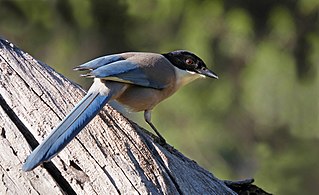
Cyana is a genus of moths in the family Erebidae. Species are well distributed in Africa, Madagascar, China, India, Sri Lanka, Myanmar, Sumatra, Java and Borneo. The genus was erected by Francis Walker in 1854.
Malo Korrigan is a French animated television series with 26 episodes, created by Arthur Qwak and Norman J. LeBlanc of Futurikon. It is a Futurikon - Tooncan - M6 Métropole Télévision - Canal J co-production and distributed by M6 Métropole Télévision. The English theme song is an original song composed for the TV series by Deep Forest. It was first aired in France during 2002; and later aired in the UK, Canada, Spain, Zimbabwe, Russia, Namibia, Kenya and on SABC1 in South Africa.

Cyana malayensis is a moth of the family Erebidae. It is found in Peninsular Malaysia, Borneo and Palawan.
CYANA is a program for automated structure calculation of biological macromolecules on the basis of conformational constraints from nuclear magnetic resonance (NMR). The combination of automated nuclear Overhauser effect spectroscopy (NOESY) cross peak assignment, structure calculation with a fast torsion angle dynamics algorithm.

Cyana puella is a moth of the family Erebidae. It is found in the north-western Himalayas, Nepal, India, Sri Lanka, Madagascar, Kenya and Eritrea.

The Iberian magpie is a bird in the crow family. It is 31–35 cm (12–14 in) long and similar in overall shape to the Eurasian magpie but is slenderer with proportionately smaller legs and bill. It belongs to the genus Cyanopica.

Cyana effracta is a moth of the family Erebidae first described by Francis Walker in 1854. It is found in Nepal, the north-eastern Himalayas, Taiwan, China, Burma, Peninsular Malaysia, Sumatra and Borneo.

Cyana hamata is a moth of the family Erebidae first described by Francis Walker in 1854. It is found in Japan, China, Taiwan, Korea and Thailand.

Cyana sanguinea is a moth of the family Erebidae first described by Otto Vasilievich Bremer and William Grey in 1852. It is found in Taiwan and China.
Cyana africana is a moth of the family Erebidae. It was described by William Jacob Holland in 1893. It is found in Gabon.
Cyana basisticta is a moth of the family Erebidae. It was described by George Hampson in 1914. It is found in Ghana and Sierra Leone.
Cyana delicata is a moth of the family Erebidae. It was described by Francis Walker in 1854. It is found in Angola, the Democratic Republic of the Congo, Ghana, Sierra Leone and Togo.
Cyana fulvia is a moth of the family Erebidae. It was described by Carl Linnaeus in his 1758 10th edition of Systema Naturae. It is found in Sierra Leone.
Cyana pretoriae is a moth of the family Erebidae. It was described by William Lucas Distant in 1897. It is found in the Democratic Republic of the Congo, Kenya, Lesotho, Malawi, Mozambique, Somalia, South Africa, Tanzania, Uganda, Zambia and Zimbabwe.
Cyana rejecta is a moth of the family Erebidae. It was described by Francis Walker in 1854. It is found in the Democratic Republic of the Congo, Ethiopia, Kenya, Malawi, Sierra Leone, South Africa, Tanzania, Gambia and Uganda.
Cyana rubristriga is a moth of the family Erebidae. It was described by William Jacob Holland in 1893. It is found in the Central African Republic, the Democratic Republic of the Congo and Gabon.
Cyana tegyra is a moth of the family Erebidae. It was described by Herbert Druce in 1899. It is found on New Guinea.
Cyana transfasciata is a moth of the family Erebidae. It was described by Walter Rothschild in 1912. It is found in New Guinea.
Cyana ugandana is a moth of the family Erebidae. It was described by Strand in 1912. It is found in the Democratic Republic of Congo, Ethiopia, Kenya and Uganda.

The Nudariina are a subtribe of lichen moths in the family Erebidae. The taxon was described by Carl Julius Bernhard Börner in 1920.








